Unit 6 Do you like bananas Section B 3a-Self Check课件(共35张PPT)
文档属性
| 名称 | Unit 6 Do you like bananas Section B 3a-Self Check课件(共35张PPT) |  | |
| 格式 | pptx | ||
| 文件大小 | 2.9MB | ||
| 资源类型 | 教案 | ||
| 版本资源 | 人教新目标(Go for it)版 | ||
| 科目 | 英语 | ||
| 更新时间 | 2022-07-04 10:18:05 | ||
图片预览

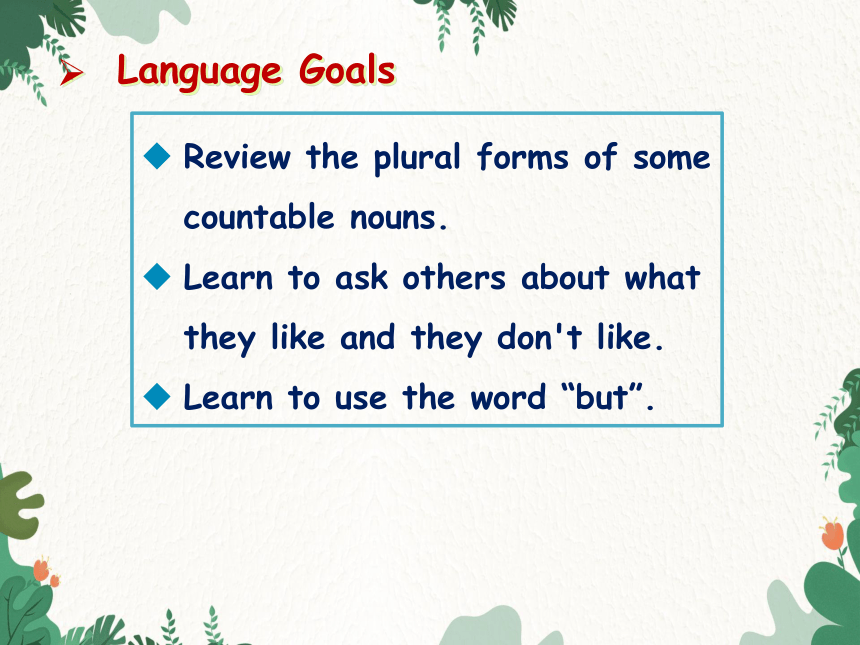
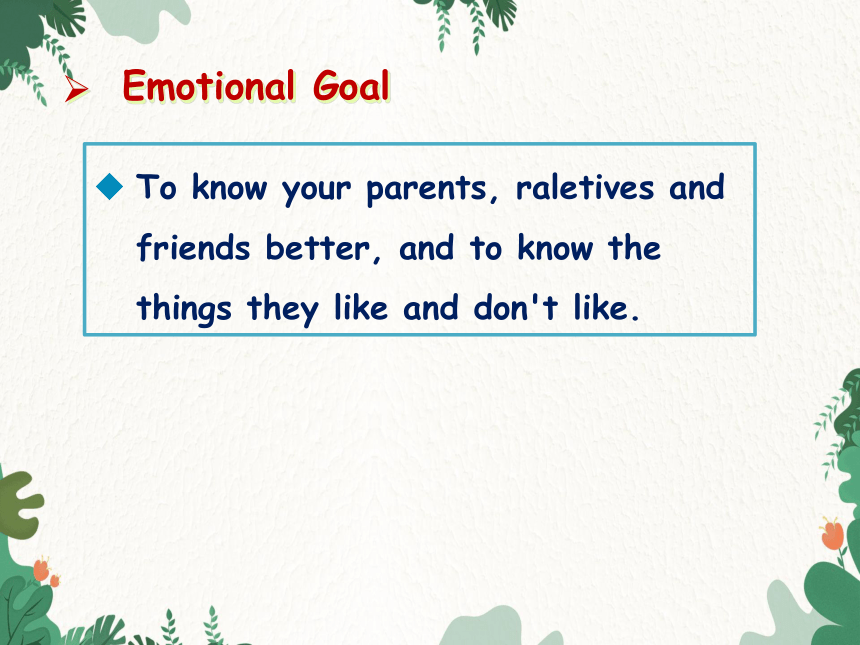
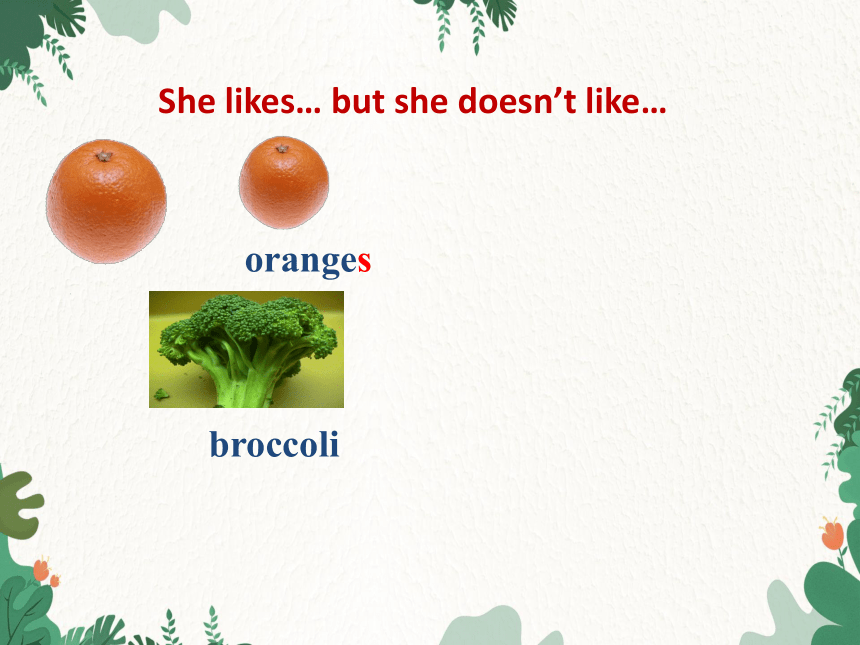
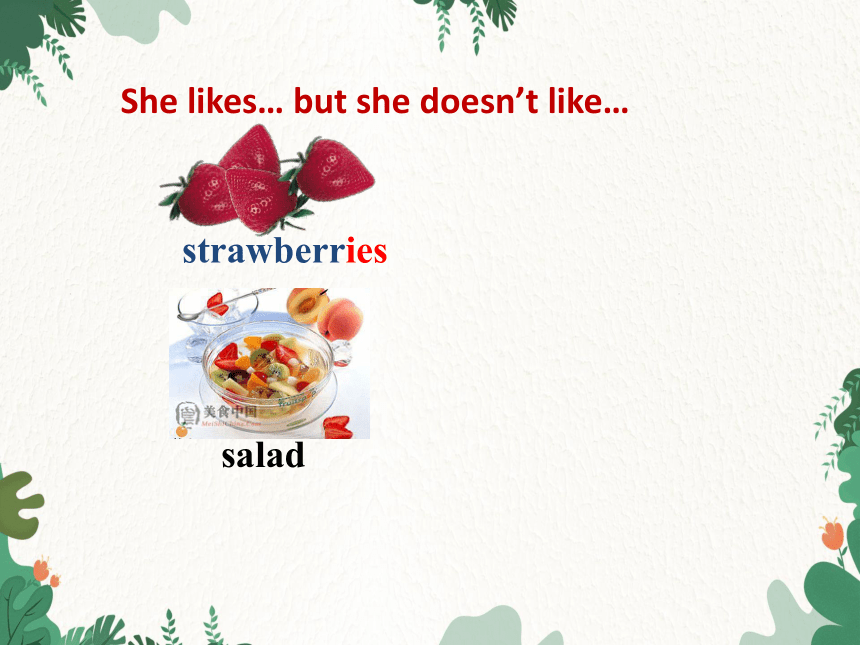
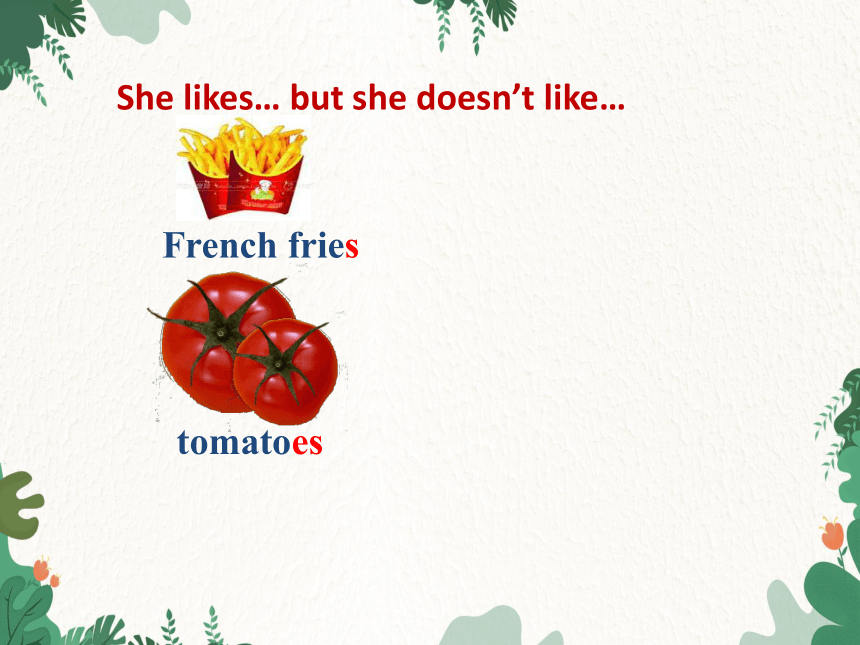
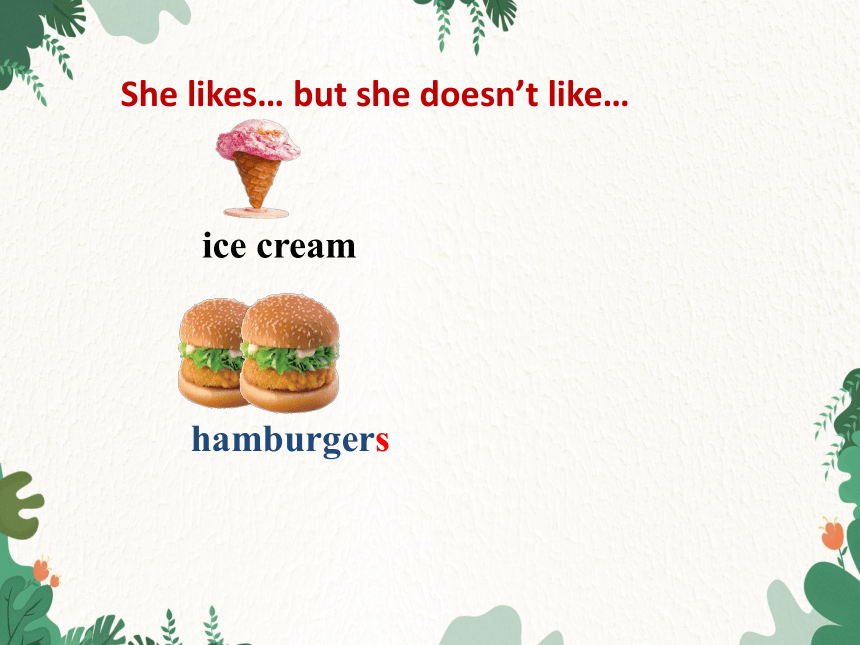
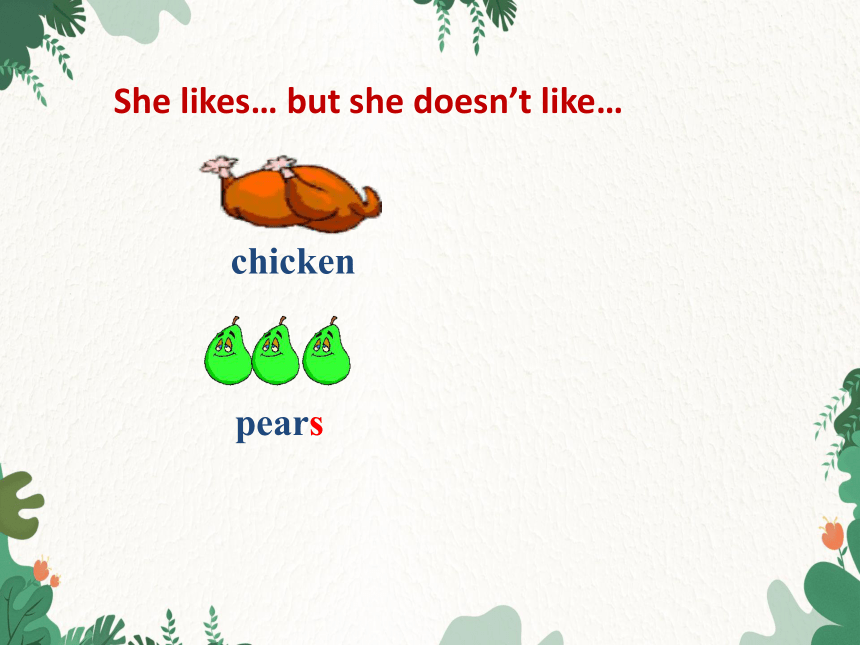
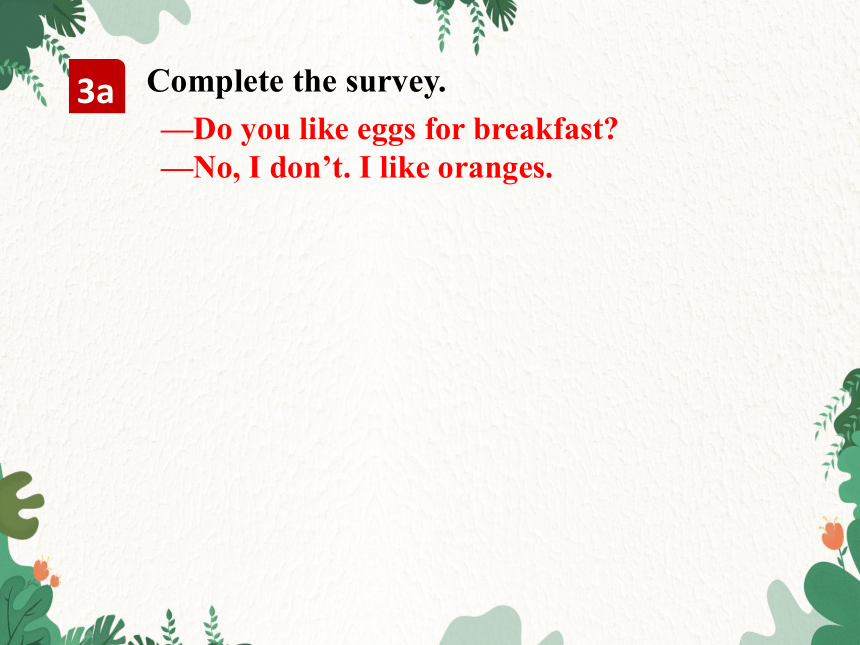
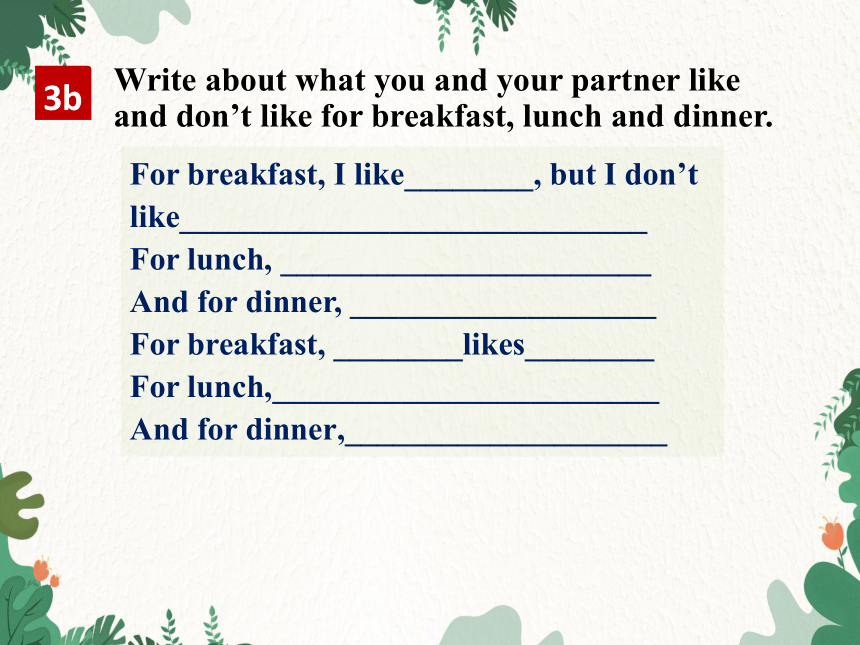
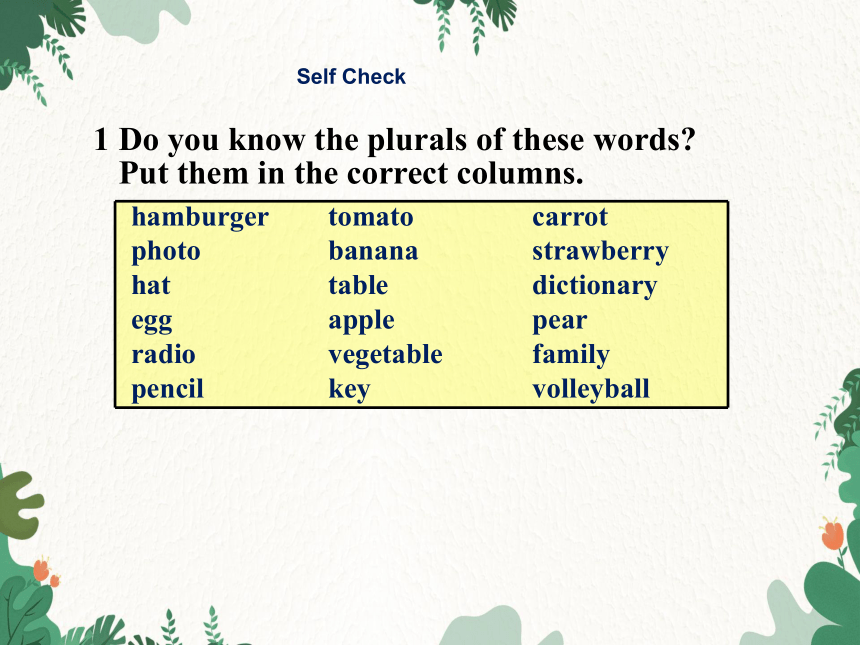

文档简介
(共35张PPT)
Section B 3a-Self Check
Review the plural forms of some countable nouns.
Learn to ask others about what they like and they don't like.
Learn to use the word “but”.
Language Goals
To know your parents, raletives and friends better, and to know the things they like and don't like.
Emotional Goal
oranges
broccoli
She likes… but she doesn’t like…
strawberries
salad
She likes… but she doesn’t like…
French fries
tomatoes
She likes… but she doesn’t like…
ice cream
hamburgers
She likes… but she doesn’t like…
chicken
pears
She likes… but she doesn’t like…
Complete the survey.
—Do you like eggs for breakfast
—No, I don’t. I like oranges.
3a
Write about what you and your partner like
and don’t like for breakfast, lunch and dinner.
For breakfast, I like________, but I don’t
like_____________________________
For lunch, _______________________
And for dinner, ___________________
For breakfast, ________likes________
For lunch,________________________
And for dinner,____________________
3b
1 Do you know the plurals of these words
Put them in the correct columns.
hamburger tomato carrot
photo banana strawberry
hat table dictionary
egg apple pear
radio vegetable family
pencil key volleyball
Self Check
+ s + es y i + es
hamburger photo hat egg radio pencil banana table apple vegetable key carrot pear volleyball tomato family
strawberry
dictionary
2. What food, sports and colors do you
like and dislike
I like
I don’t like
basketball,
soccer ball,
volleyball,
tennis ball,
baseball,
ping-pong ball
swim…
white , black, red ,
orange , yellow,
green , blue,
pink, purple,
brown …
apple, orange,
pear, strawberry,
banana, chicken,
salad, milk, carrot,
hamburger,
watermelon, bread,
tomato…
food
colors
sports
3. What food, sports and colors do your
parents like and dislike Write at least
five sentences.
My mother / father likes apples/swimming/red…
2. My mother / father doesn’t like pears / basketball / purple…
3. My mother / father likes apples/swimming/red… , but she / he doesn’t like…
4. My parents like strawberries/ watching TV / green…
Ask your classmates what they like to eat for lunch.
Find someone who likes to eat the same lunch as you.
l_ke ____ ha_e ____
_at ____ s_ar ____
d_nner ____ r__n ___
l___ch ____ _ood ____
v
t
e
i
u
明星
有
喜欢
跑
食物
吃
晚饭
午饭
f
un
i
Complete the words and tell us the
Chinese meaning of each word.
carrot
tomato
pear
apple
Match the words with the pictures.
1.当主语是第一、二人称单复数和第三人称复数时, 肯定句
的谓语由动词原形充当。否定句的谓语为don’t+动词原形。
一般疑问句句首用Do, 句中的谓语用动词原形。
e.g. I like tomatoes.
I don’t like hamburgers.
Do you like tomatoes
Simple present tense—like
Language points
2. 在一般现在时中, 当主语是第三人称单数时, 其
肯定句的谓语由动词原形+s(es)构成。
否定句的谓语由doesn’t+动词原形构成。
一般疑问句句首用does, 句中的谓语用动词原形充当。
e.g. She likes apples.
She doesn’t like chicken.
Does she like apples
肯定句
I/you/we/they like French fries.
He/she likes ice-cream.
否定句
I /you/we/they don’t like tomatoes.
He/she doesn’t like French fries.
动词“like”的肯定句、否定句的用法
一般疑问句的肯定/否定回答
—Do you like hamburgers
—Yes, I do. / No, I don’t.
—Does he/she like broccoli
—Yes, he/she does.
/No, he/she doesn’t.
Practice the conversation with
your partner.
A: Do you like oranges
B: No, I don’t.
A: Do you like bananas
B: Yes, I do.
1. banana
2. hamburger
3. tomato
4. broccoli
5. French fries
6. orange
7. ice-cream
8. salad
9. strawberry
草莓
香蕉
汉堡包
番茄;西红柿
花椰菜
薯条
冰淇淋
橘子
沙拉
I. 连线。
Exercises
10. chicken
11. fruit
12. vegetable
13. breakfast
14.runner
15. a lot of
16. healthy
17. dessert
18. list
很多
鸡肉
水果
蔬菜
早餐
赛跑的人
健康的
甜点心
目录
II.单项选择。
1. ____ he like salad
A. Is B. Do C. Does D. Are
2. Do you like broccoli No, ______
A. I do. B. I doesn’t. C. I does. D. I don’t
3. Do you have some _____
A. oranges B. tomatos
C. hamburger D. banana
4. Let’s _____ ice-cream.
A. eat B. to eat C. eating D. eats
C
D
A
A
Ⅲ.完成句子。
1. I have _________(大量,许多) books in my home.
2. My family have _______________ (健康食品)
for meals.
3. They do sports _____________(每天).
4. My sister Kate likes bananas, apples __________
(早饭).
5. Those carrots are _________(汤姆的).
many
healthy food
for breakfast
Every day
Tom’s
6. Lucy ________(like) tomatoes very much.
7. _______ he _________(have) hamburgers
for breakfast
8. What ______ you often ______ (do) after supper
9. They ___________(not have) many CDs, but
they _______(have) a lot of video cassettes.
10. Let’s _______(play) computer games.
likes
Does
have
do
do
don’t have
have
play
IV. 句型转换。
1. His brother has lunch at home. (否定句)
His brother ______________ lunch at home.
2. He likes ice-cream very much. (一般疑问句)
______ he _______ ice-cream very much
3. She has lunch at school. (画线提问)
___________ she ________ lunch
4. I have a pen and a pencil. (画线提问)
__________ you have
doesn’t have
Does like
Where does have
What do
5. Kate likes her new hat. (一般疑问句)
_______ Kate _______ her new hat
6. Do they like salad for dinner (肯否定回答)
Yes, ___________. No, _____________.
7. 他喜欢蔬菜吗 是的, 他喜欢。
--______ he _______ vegetables
--Yes, ___________.
Does like
they do
they don’t.
Does like
he does
8. She has two eggs for breakfast.(一般疑问句)
______ she ______ two eggs for breakfast
9. This is a hamburger.(复数)
These ___________________.
10. We have chicken and eggs for dinner.
(画线提问)
________ you have for dinner
Does have
are hamburgers
What do
Summary
How many words and phrases can you
remember in this unit Have a competition
with your classmates.
2. What did your have for breakfast, lunch
and supper yesterday What about your
parents
Homework
Review all the words and phrases in Unit5.
2. Write a small article to describe the eating
habits of your family.
3. Prepare for the test of Unit 6.
Section B 3a-Self Check
Review the plural forms of some countable nouns.
Learn to ask others about what they like and they don't like.
Learn to use the word “but”.
Language Goals
To know your parents, raletives and friends better, and to know the things they like and don't like.
Emotional Goal
oranges
broccoli
She likes… but she doesn’t like…
strawberries
salad
She likes… but she doesn’t like…
French fries
tomatoes
She likes… but she doesn’t like…
ice cream
hamburgers
She likes… but she doesn’t like…
chicken
pears
She likes… but she doesn’t like…
Complete the survey.
—Do you like eggs for breakfast
—No, I don’t. I like oranges.
3a
Write about what you and your partner like
and don’t like for breakfast, lunch and dinner.
For breakfast, I like________, but I don’t
like_____________________________
For lunch, _______________________
And for dinner, ___________________
For breakfast, ________likes________
For lunch,________________________
And for dinner,____________________
3b
1 Do you know the plurals of these words
Put them in the correct columns.
hamburger tomato carrot
photo banana strawberry
hat table dictionary
egg apple pear
radio vegetable family
pencil key volleyball
Self Check
+ s + es y i + es
hamburger photo hat egg radio pencil banana table apple vegetable key carrot pear volleyball tomato family
strawberry
dictionary
2. What food, sports and colors do you
like and dislike
I like
I don’t like
basketball,
soccer ball,
volleyball,
tennis ball,
baseball,
ping-pong ball
swim…
white , black, red ,
orange , yellow,
green , blue,
pink, purple,
brown …
apple, orange,
pear, strawberry,
banana, chicken,
salad, milk, carrot,
hamburger,
watermelon, bread,
tomato…
food
colors
sports
3. What food, sports and colors do your
parents like and dislike Write at least
five sentences.
My mother / father likes apples/swimming/red…
2. My mother / father doesn’t like pears / basketball / purple…
3. My mother / father likes apples/swimming/red… , but she / he doesn’t like…
4. My parents like strawberries/ watching TV / green…
Ask your classmates what they like to eat for lunch.
Find someone who likes to eat the same lunch as you.
l_ke ____ ha_e ____
_at ____ s_ar ____
d_nner ____ r__n ___
l___ch ____ _ood ____
v
t
e
i
u
明星
有
喜欢
跑
食物
吃
晚饭
午饭
f
un
i
Complete the words and tell us the
Chinese meaning of each word.
carrot
tomato
pear
apple
Match the words with the pictures.
1.当主语是第一、二人称单复数和第三人称复数时, 肯定句
的谓语由动词原形充当。否定句的谓语为don’t+动词原形。
一般疑问句句首用Do, 句中的谓语用动词原形。
e.g. I like tomatoes.
I don’t like hamburgers.
Do you like tomatoes
Simple present tense—like
Language points
2. 在一般现在时中, 当主语是第三人称单数时, 其
肯定句的谓语由动词原形+s(es)构成。
否定句的谓语由doesn’t+动词原形构成。
一般疑问句句首用does, 句中的谓语用动词原形充当。
e.g. She likes apples.
She doesn’t like chicken.
Does she like apples
肯定句
I/you/we/they like French fries.
He/she likes ice-cream.
否定句
I /you/we/they don’t like tomatoes.
He/she doesn’t like French fries.
动词“like”的肯定句、否定句的用法
一般疑问句的肯定/否定回答
—Do you like hamburgers
—Yes, I do. / No, I don’t.
—Does he/she like broccoli
—Yes, he/she does.
/No, he/she doesn’t.
Practice the conversation with
your partner.
A: Do you like oranges
B: No, I don’t.
A: Do you like bananas
B: Yes, I do.
1. banana
2. hamburger
3. tomato
4. broccoli
5. French fries
6. orange
7. ice-cream
8. salad
9. strawberry
草莓
香蕉
汉堡包
番茄;西红柿
花椰菜
薯条
冰淇淋
橘子
沙拉
I. 连线。
Exercises
10. chicken
11. fruit
12. vegetable
13. breakfast
14.runner
15. a lot of
16. healthy
17. dessert
18. list
很多
鸡肉
水果
蔬菜
早餐
赛跑的人
健康的
甜点心
目录
II.单项选择。
1. ____ he like salad
A. Is B. Do C. Does D. Are
2. Do you like broccoli No, ______
A. I do. B. I doesn’t. C. I does. D. I don’t
3. Do you have some _____
A. oranges B. tomatos
C. hamburger D. banana
4. Let’s _____ ice-cream.
A. eat B. to eat C. eating D. eats
C
D
A
A
Ⅲ.完成句子。
1. I have _________(大量,许多) books in my home.
2. My family have _______________ (健康食品)
for meals.
3. They do sports _____________(每天).
4. My sister Kate likes bananas, apples __________
(早饭).
5. Those carrots are _________(汤姆的).
many
healthy food
for breakfast
Every day
Tom’s
6. Lucy ________(like) tomatoes very much.
7. _______ he _________(have) hamburgers
for breakfast
8. What ______ you often ______ (do) after supper
9. They ___________(not have) many CDs, but
they _______(have) a lot of video cassettes.
10. Let’s _______(play) computer games.
likes
Does
have
do
do
don’t have
have
play
IV. 句型转换。
1. His brother has lunch at home. (否定句)
His brother ______________ lunch at home.
2. He likes ice-cream very much. (一般疑问句)
______ he _______ ice-cream very much
3. She has lunch at school. (画线提问)
___________ she ________ lunch
4. I have a pen and a pencil. (画线提问)
__________ you have
doesn’t have
Does like
Where does have
What do
5. Kate likes her new hat. (一般疑问句)
_______ Kate _______ her new hat
6. Do they like salad for dinner (肯否定回答)
Yes, ___________. No, _____________.
7. 他喜欢蔬菜吗 是的, 他喜欢。
--______ he _______ vegetables
--Yes, ___________.
Does like
they do
they don’t.
Does like
he does
8. She has two eggs for breakfast.(一般疑问句)
______ she ______ two eggs for breakfast
9. This is a hamburger.(复数)
These ___________________.
10. We have chicken and eggs for dinner.
(画线提问)
________ you have for dinner
Does have
are hamburgers
What do
Summary
How many words and phrases can you
remember in this unit Have a competition
with your classmates.
2. What did your have for breakfast, lunch
and supper yesterday What about your
parents
Homework
Review all the words and phrases in Unit5.
2. Write a small article to describe the eating
habits of your family.
3. Prepare for the test of Unit 6.
同课章节目录
- starters 预备篇(2012秋审查)
- Unit 1 Good morning !
- Unit 2 What’s this in English?
- Unit 3 What color is it ?
- Unit 1 My name's Gina.
- Section A
- Section B
- Unit 2 This is my sister.
- Section A
- Section B
- Unit 3 Is this your pencil?
- Section A
- Section B
- Unit 4 Where's my schoolbag?
- Section A
- Section B
- Unit 5 Do you have a soccer ball?
- Section A
- Section B
- Unit 6 Do you like bananas?
- Section A
- Section B
- Unit 7 How much are these socks?
- Section A
- Section B
- Unit 8 When is your birthday?
- Section A
- Section B
- Unit 9 My favorite subject is science.
- Section A
- Section B
